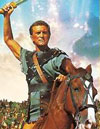|

Spartacus
Year of Release: 1960
Cast: Kirk Douglas, Laurence Olivier, Jean Simmons, Tony Curtis, Charles Laughton, Peter Ustinov, Herbert Lom, John Dall, Nina Foch, Woody Strode
Director: Stanley Kubrick
Writer: Dalton Trumbo
Rating: PG-13
Running Time: 196 Minutes (3 hours, 16 minutes)
Academy Awards: Best Supporting Actor (Ustinov), Art Direction, Cinematography, Costume Design.
Academy Award Nominations: Best Film Editing, Original Dramatic/Comedy Score.
Spartacus is one of the greatest of the classic Hollywood epics, because it succeeds on a technical as well as an emotional level. Story is not sacrificed for style, and while we marvel at the stunning battle sequences and the amazing recreation of a time centuries past, we are never allowed to lose sight of the characters and their individual motivations.
The story centers around the slave Spartacus, who in 73 B.C. led an unsuccessful slave uprising against the Roman Empire. The film is divided into three well-balanced major acts, the first of which introduces us to Spartacus as a rebellious slave who is purchased by the money-hungry Batiatus (Peter Ustinov) and receives training as a gladiator. Spartacus meets and falls in love with Varinia (Jean Simmons), another slave owned by Batiatus, and his feelings for her lead to an even greater desire to be free. In the second act, he incites a rebellion among the slaves of Batiatus which eventually spreads to a larger scale, encompassing a large percentage of the slave population in Italy. And the third and final section of the film begins with an epic battle in which the slave army faces off against the legions of Rome, and concludes with the aftermath of that momentous struggle.
Although it sports an incredible cast featuring some of the best actors in film history, the movie has its ups and downs as far as performances are concerned. Much of the dialogue delivery seems stilted, especially by today's standards. Douglas is wooden at times, passionate at others, and many of the bit characters are excessively dull. But there are some wonderfully
memorable performances as well, including Peter Ustinov in his Oscar-winning supporting role as Batiatus, the comic relief of the film and a scene-stealer extraordinaire. Equally good is Charles Laughton, who gets the best lines in the film as the world-wise Roman senator Gracchus (the scene late in the movie involving Ustinov and Laughton is one of the best in the film, simply because of the line delivery). The legendary Laurence Olivier brings greatness to the role of the antagonist, Crassus; admittedly, it's a one-dimensional character, but Olivier manages to make him interesting nonetheless. Much the same can be said of Simmons, luminous in the obligatory love interest role.
Technically, Spartacus is quite an achievement. The world of Ancient Rome is completely believable here, due in no small part to the designs of the sets and costumes (both of which won Academy Awards). The climactic battle scene was accomplished during a six-week period, with the help of 8,000 real Spanish soldiers. It's telling that the world of Rome in this film is brought to life more convicingly than that in the modern film Gladiator, but without the help of computer generated effects.
The film was a great financial success and helped put director Stanley Kubrick on the map, giving him the clout needed to make such later risky classics as Dr. Strangelove, 2001: A Space Odyssey, and A Clockwork Orange. Indeed, Spartacus is the most atypical of Kubrick's films, and it was one of his least favorite of his own works, but it is a great movie nevertheless. The story may be rather simple, but the film is not intended to be a great work of art with deep insights into human behavior; it is meant to be a technically astounding epic with rousing entertainment value, and at this it succeeds magnificently. The plot is character-driven, and the storyline is never overwhelmed by the settings and pretty pictures (a common flaw in many epics). The humor that is occasionally blended with the drama works well, and also laudable is the realistic ending.
On a final note, if you're seeing Spartacus for the first time, try to obtain the 1991 restored version, which contains several scenes that didn't make the original cut, including the infamous bathing scene with Crassus and his manservant, Antoninus (Tony Curtis). Deemed too homoerotic at the time of the original release, it is fairly tame by today's standards, and Sir Anthony Hopkins dubbed Olivier's innuendo-laden lines of dialogue for the restoration. The picture is clearer, and the film needs to be seen in a widescreen format in order to completely appreciate the award-winning photography. Not one of the deepest films of all time by any means, this is still required viewing for movie buffs, and a classic in its own right.



 - Excellent
- Excellent
|
